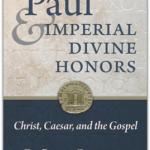
This post is part of an attempt to bring John Piper along for the ride, blogging through the Together for the Gospel statement. I have already posted a quote from him on Building our Lives on the Bible, the subject of the first two articles. Today we will bring you Piper on “Truth and Pragmatism” – the subject of the third article of the T4G statement.
I have also posted from Doctor Martyn Lloyd-Jones writings on The Introduction and Articles 1, 2, and 3. I have also posted myself on the Introduction, as well as a Combined Post on Articles I and II. If you haven’t already done so, I would encourage you to read the statement in full – it is available as a pdf or Google’s HTML version.This post is part of an ongoing bloggers challenge I have set to encourage us all to work through this statement systematically – thanks to Crossway for donating five copies of God is the Gospel to encourage your participation!
So, let’s join John Piper as he addresses this issue in God’s Passion for his Glory – a book he has made available as a free pdf on his site.
Americans, as a whole (and evangelicals are little different in this) are not given to thinking much, let alone thinking at the level Edwards demands of us. This is especially true about doctrine. We are pragmatic. We demand quick solutions. We define success in measurable quantities. We have little patience with doctrinal precision. And we pastors who are infected with the pragmatic virus tend to justify our indifference to doctrine mainly by the fact that such reflection is not what the audience is looking for. Besides, it is stressful for relationships.
The recent lamentations over the drift of evangelicalism into pragmatic, doctrinally vague, audience-driven, culturally uncritical Christianity are, in my judgment, warranted and needed in spite of the fact that, at the level of professional scholarship, there have been remarkable advances in the last fifty years.
As a whole, and in the dominant shaping forces of evangelicalism, the criticism of Harry Blamires in 1963 is probably more true than ever: “There is no Christian Mind . . . The Christian Mind has succumbed to the secular drift with a degree of weakness unmatched in Christian history.”
The increasing abandonment of truth and moral absolutes in our culture, as militant diversity threatens all firm conviction, has dramatically influenced the evangelical mindset. The political spin doctors who specialize in deflecting attention away from truth onto feelings and relationships and styles have their counterpart in the evangelical tendency to avoid doctrinal disputes by casting issues in terms of demeanor and method rather than truth. Serious disagreements are covered over, while vague language and pragmatic concerns preserve hollow unity at the expense of theological substance and Biblical clarity and power . . .
“A major shift . . . has taken place in western evangelicalism where truth has been replaced by pragmatism as the major influencer of thought and life. This path is suicidal.” He is heartened that voices are being raised, but then he says, “However, I feel that many evangelical leaders are so caught up in and blinded by this bondage to pragmatism that even though they may heartily endorse pleas to return to greater dependence on truth, endorsements make minimal inroads into their ministry styles and strategies.” There is simply too little patience with the particularities of Biblical propositions that embody precious, life-sustaining doctrine.
Jonathan Edwards had a profound insight into this very state of affairs, and it has to do directly with the absence of God centeredness: “It is one great reason why speculative points [of doctrine] are thought to be of so little importance that the modern religion consists so little in respect to the divine Being, and almost wholly in benevolence to men.”
In other words, the sickness that needs healing is the main hindrance to the remedy. This means that Jonathan Edwards’ “grand style of feeling and thinking is not ours and is alien to our way of life.” Edwards’ utter seriousness – his “blood-earnestness,” as Thomas Chalmers called it – puts him out of sync with our chatty, humorous, entertainment-oriented, cartoon-illustrated spirituality. Edwards’ sense of the desperate condition of mankind without God is so weighty that it takes our breath away . . .
It may be that the theological impoverishment of the American church, and the precariousness of life, and the weariness with “successful” superficiality will make the voice of Jonathan Edwards more compelling than he has been for centuries . . .
Evangelical Christians, who believe God reveals himself primarily through a book, the Bible, should long to be the most able readers they can be. This means that we should want to become clear, penetrating, accurate, fair-minded thinkers, because all good reading involves asking questions and thinking. This is one reason why the Bible teaches us, “Do not be children in your thinking; be babes in evil, but in thinking be mature” (1 Cor. 14:20 RSV). It’s why Paul said to Timothy, “Think over what I say, for the Lord will grant you understanding in everything” (2 Tim. 2:7). God’s gift of understanding is through thinking, not instead of thinking . . .
. . . since our media-intoxicated culture is neither given to thinking, nor to straining Godward,
the challenge and the potential of reading Edwards is doubled . . . In all this I long to persuade you to read and embrace Jonathan Edwards’ The End for Which God Created the World.
Edwards is strongest where we are weakest. He knows God. He sees and savors the supremacy of God in all things. Our culture is dying for want of this vision and this food.















